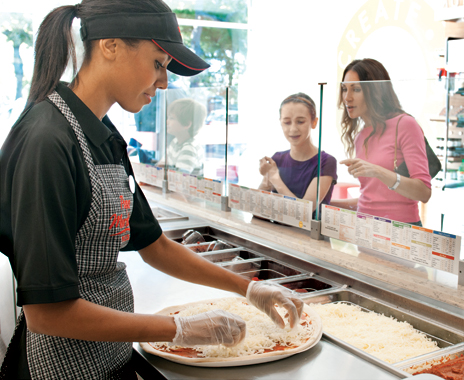More than 2 million Americans have served in the wars in Iraq and Afghanistan, and as they return home, restaurant brands are realizing that this new generation of military veterans may make ideal franchisees.
These partnerships are increasingly benefitting veterans looking for post-service employment, as well as limited-service companies, which receive battle-tested franchisees to serve on the frontlines.
“These veterans have the decision-making skills, reasoning abilities, and ethics that I believe are the same traits that UFood stands for,” says Sal Rincione, a U.S. Army veteran and CEO of UFood Grill, a health-focused brand that is seeking opportunities to work with the new generation of veterans. He adds that he received “some of the best training in the world” while in the military.
According to a recent poll conducted by VetFran, an organization that encourages opportunities between veterans and franchisors, about 14 percent of all retail franchises are owned by veterans, accounting for about 66,000 businesses nationwide. Franchisors like veterans for their discipline and ability to understand how to work within a system.
“[In the military,] instructions are vague enough that you know what you should be doing, but they don’t tell you how to be doing it,” says George Eldridge, manager of VetFran and a 12-year veteran of the Air Force. “That’s what the franchise system is. It’s specific enough that you have a clue and it can point you in the right direction, but it doesn’t necessarily tell you how to do it.”
Fresh from deployments across the globe, veterans—many of whom are Millennials—possess qualities that set them apart from earlier generations. One characteristic that stands out to Scott Mellon, vice president of franchising at Papa Murphy’s, is their relationship with technology.
“They’re coming in with a high understanding of technology, and I think that’s important in starting any business—especially going into the franchising space,” Mellon says.
Iraq and Afghanistan veterans, regardless of age, had to use sophisticated technologies on a regular basis during their military careers. “If they see an opportunity for automating something or making it easier by leveraging technology, they will do that,” says Jayson Tipp, Papa Murphy’s chief development officer and senior vice president. He adds that franchisees without recent military experience might not have that familiarity.
Papa Murphy’s has had great success with veteran franchise owners and was even highlighted by U.S. Veterans Magazine. The bake-at-home pizza chain has been working with VetFran for more than five years and waives up to $25,000 in royalty fees for veterans over the first three years of ownership. Twenty owners have come into Papa Murphy’s through VetFran, and 12 more are in development.
The timing of such an influx is especially fortunate. Papa Murphy’s has nearly completed a multi-year digital point-of-sale rollout, recently launched a mobile app, and is working with Deloitte Digital to develop an e-commerce platform. It’s a lot of change, and Mellon thinks an existing owner might be initially resistant compared with a recent veteran, who probably wouldn’t think twice about using new technology.
UFood Grill’s Rincione became CEO in March and quickly signed the brand up with VetFran. UFood Grill offers a 50 percent discount on franchise fees to veterans. It also has locations on seven Air Force bases.
Rincione says UFood Grill is an especially good fit for this generation of veterans. “Veterans coming out now are different from when I got out of the military,” he says. “The veterans that are coming out now are looking at healthier choices.”
Today’s military receives nutrition education while in the service. The Department of Defense’s “Go for Green” program teaches servicemen and women to make healthier choices by coding food as red (high in saturated fat and calories), yellow (high in calories and/or containing some saturated fat), and green (a nutritious option).
Rincione says UFood Grill is a hit with the military because 90 percent of the menu scores green.
As more franchises realize the value of veterans, competition for them is increasing. Eldridge says franchises that are looking to work with veterans should get in front of potential partners by being active in organizations like VetFran.
To join VetFran, franchisors must offer at least a 10 percent discount on their franchise fee, and many franchises—like Papa Murphy’s and UFood Grill—have begun offering larger ones. UFood Grill has also partnered with Kingswood Leasing to help veterans finance UFood Grill restaurants.
The average age of a franchisee is between 55 and 65 years old, Eldridge says. They are typically retirees looking for a second career.
“The challenge now is how do we target the 25–35-year-olds, those individuals who only served one or two enlistments?” he says. “They don’t have that retirement income, [so] how do we start attracting those individuals to the franchising industry?”
At UFood, Rincione promises to personally work with veterans to help them secure locations, construct the building, and transition back into civilian life. Eldridge thinks today’s veterans are more interested in owning businesses than the veterans of the past few decades, he says.
“It’s almost similar to what you saw after World War II. What did they do when they came back? They started small businesses,” Eldridge says. “I think that is coming around again.”











